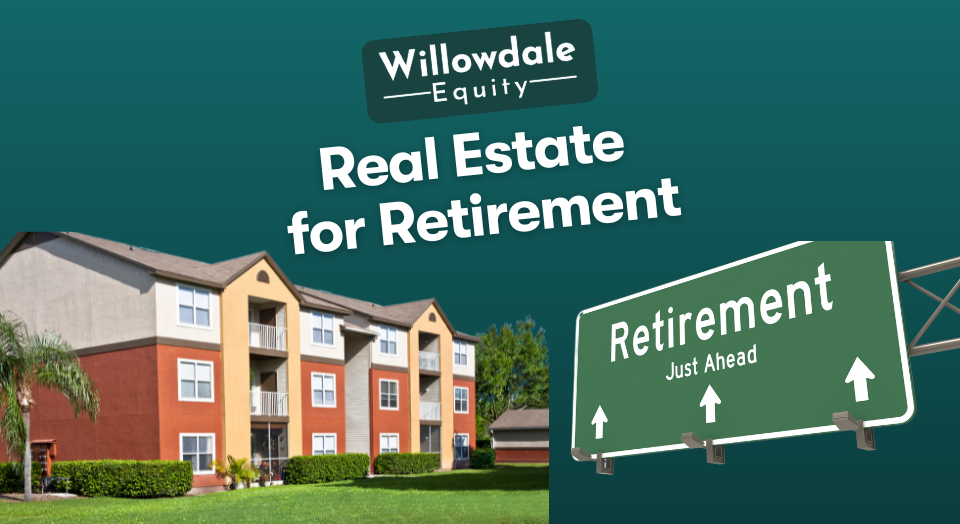
Real Estate for Retirement: How to Choose the Best Property for Retirement
This article is part of our guide on self-directed IRA multifamily real estate investing, available here.
When it comes to retirement real estate investment, there are a lot of things to consider. You want to find the best property for you, and you want to make sure that you’re getting a good return on your investment.
In this blog post, we’ll discuss some of the things you need to consider when choosing real estate for retirement. We’ll also provide tips on getting started in real estate investing!
Key Takeaways
-
Unlike the stock market or bonds, real estate is a physical asset you can see and touch. This makes it less susceptible to market fluctuations and gives you a sense of security, knowing that your investment is tangible.
-
The first step is determining how much money you’ll need each month in retirement. When choosing this amount, be sure to build in a bit of a cushion for miscellaneous expenses.
-
A passive investment such as a rental, rather than a very active strategy like flipping houses, is usually the more appealing choice. One of the best passive investments is a rental property that generates positive monthly cash flow.
-
While real estate investing can be a great way to secure your retirement, there are a few drawbacks to investing by yourself. First, finding good deals on properties can be challenging without access to an extensive network of other investors or brokers.
Is Real Estate a Good Investment for Retirement?
Yes, real estate can be a fantastic investment for retirement. It might even be the best option out there! Real estate is a stable and predictable investment, and it has historically provided good returns over time. This is due in part to the security real estate offers. Unlike the stock market or bonds, real estate is a physical asset you can see and touch. This makes it less susceptible to market fluctuations and gives you a sense of security, knowing that your investment is tangible. It is also a hedge against inflation, as real estate value usually increases with inflation.
Also, because people will always need somewhere to live, real estate is a relatively recession-proof investment. In times of economic instability, the rental market usually stays firm, so you can still make money off your real estate investment.
A Real Estate Investment Retirement Plan That Makes Sense

To make real estate investing a part of your retirement plan, there are some basic steps you need to take. The first step is determining how much money you’ll need each month in retirement. When choosing this amount, be sure to build in a bit of a cushion for miscellaneous expenses.
Next, you want to estimate the net rental income your real estate investments will provide. This number should be greater than or equal to the amount you determined. Doing this will ensure you have the appropriate retirement income from your real estate holdings.
Also, a great thing about living off of your rental income comfortably is that in the background, your property value is also increasing, and your mortgage is decreasing through amortization. This means that even if you spent 100% of your retirement income on your real estate assets, you would still be building wealth without working. You could also refinance your property’s debt in retirement and pull out some of that equity to supplement your income.
What Makes a Good Investment Property for Retirement?
There are a few things to consider when deciding what type of real estate you want to own in retirement. Many individuals would instead not participate in their retirement investing plans. Therefore a passive investment such as a rental, rather than a very active strategy like flipping houses, is usually the more appealing choice. One of the best passive investments is a rental property that generates positive monthly cash flow.
Factors such as proximity to public transportation, schools, and parks are all things that any real estate investor should consider when looking at potential investment properties. The rental property you select should have a good chance of increasing in value over time and be located in an area that is likely to experience growth. Additionally, finding a property that is likely to be rented out quickly and efficiently is essential.
Good Read: How Many Rentals Do You Need to Retire
Retirement Real Estate Investment: - (Property for Retirement)
You want to be buying rental properties that have multiple units. The more units a property has, the more insulated it is from a bad event. For example, suppose as many as ten tenants on a 100-unit property fail to pay their rent on any given month while the remaining 90 successfully make their rent. In that case, the property will likely still be able to be cash flow positive. Multifamily commercial properties are the best for a more consistent cash flow.
Retirement shouldn’t be stressful, so this needs to be factored into your retirement planning. Ideally, the type of property that is best for retirement is a sizeable multi-unit asset located in a good location of a strong market that produces enough cash flow to put good property management in place so you can remain a passive real estate investor for the rest of your life. Owning one large property versus several smaller ones is better to keep things easy. It can become tough to track when property taxes and mortgage renewals are due when they all come up at different times.
Real Estate Investment Trust or REIT
Another real estate investment option for retirement is to invest in real estate investment trusts or REITs. A REIT is a company that owns and operates income-producing real estate. REITs allow you to invest in a diversified real estate portfolio without being a property owner. This is a way of investing in real estate without owning rental properties.
When considering a REIT for your retirement plan, looking at the underlying real estate is essential. Not all real estate is created equal, and some real estate may be better suited for a retirement portfolio than others. The best real estate investment trusts will own high-quality properties in desirable locations.
There are a few downsides to REITs, the biggest being that they can be pretty volatile. The other downside is that they don’t always generate income. However, over time they have tended to produce positive returns and are a relatively low-risk investment compared to the stock market.
The main downside of REITs is that they generate a good deal of taxable income. This can be a real sticking point for retirees already dealing with limited funds. However, REITs can be an excellent investment for those with a larger tax bill than they’d like to admit.
The Problem With the Perfect Property for Retirement

While real estate investing can be a great way to secure your retirement, there are a few drawbacks to investing by yourself. First, finding good deals on properties can be challenging without access to an extensive network of other investors or brokers.
Additionally, real estate investments can be risky if you don’t have experience, and it’s essential to have a solid understanding of the market before making any commitments. Finally, managing your real estate investments can be time-consuming and require much work. If you’re not prepared to put in the time and effort, it might be best to work with other investors to reach your goals.
Real estate investing isn’t easy. Finding the perfect investment property is a task that many people struggle with. Also, once you find a fantastic opportunity, what if you don’t have the down payment for it? And even if you do, how can you ensure it’s the right property? And even then, how can you be sure that you are optimizing the property to yield the highest return? There is a way to solve these issues. It’s by investing in something called a real estate syndication.
What is a Real Estate Syndication?
A real estate syndication is a real estate investment made up of multiple investors. The General Partners (GP) of a real estate syndication are in charge of finding the best property, negotiating the best deal, and managing the property in exchange for sweat equity. The Limited Partners (LP) are the ones who provide the money for the deal. LPs hold no liability in the deals they invest in other than their capital investment. GPs typically go after more significant commercial investments because they can get a higher return on their efforts since larger assets have more considerable upside potential.
The great thing about real estate syndications is that you can invest in deals you usually would not have access to because of your lack of capital. You can also invest in deals with less risk because the GPs are highly experienced and will have already done all of the research for you. They have also built relationships with the right people that bring them the best real estate deals.
Tax Advantages of Syndications
In addition to the previously mentioned advantages, a few tax benefits of real estate syndications don’t exist when you invest in other passive investments, such as real estate investment trusts. Firstly, any depreciation taken on the property can be written off on your taxes. Any interest paid on the loan used to finance the property can be deducted from your taxes. Also, any fees delivered to the GP or the LP can be deducted from your taxes.
Overall, real estate syndications offer several tax benefits that can save you a lot of money in the long run. By working with syndications, you can ensure that you’re getting the best possible deal on your real estate investments while reaping the benefits of the tax breaks and reducing your overall risk, even without any commercial property experience.
Frequently Asked Questions About Property For Retirement
There is no one-size-fits-all answer to this question. It depends on various factors, including your age, retirement goals, and investment experience. That said, real estate can be a great way to secure your retirement if you choose the right property and invest wisely.
Real estate retirement is a term used to describe real estate investments as a tool for securing your retirement. These investments can come in many forms, including rental properties, commercial property, and land.
Everyone’s preferences are different, but a good rule of thumb is to invest between 20 and 40 percent of your portfolio in real estate. This will give you enough exposure to the real estate market without putting all of your eggs in one basket.
Rental property can be an excellent investment for retirees, but it’s essential to do your research before making any commitments. Ensure you understand the market you’re investing in, the risks involved, and your potential returns.
Real Estate for Retirement - Conclusion
When it comes to real estate investment, there are a lot of things to consider. You want to find the best property for you, and you want to make sure that you’re getting a good return on your investment. If you’re unsure where to start, real estate syndication can be a great way to get involved in the market.
With a real estate syndication, you can invest in deals you usually would not have access to and reduce your risk by working with experienced investors. You will also receive 100% passive income, which means you’ll have more time to enjoy life to the fullest. Now that you know a little more about real estate investment, it’s time to start thinking about how you can use this tool to secure your retirement.
Interested In Learning More About PASSIVE Real Estate Investing In Multifamily Properties?
Get Access to the FREE 5 Day PASSIVE Real Estate Investing Crash Course.
In this video crash course, you’ll learn everything you need to know from A to Z
about passive investing in multifamily real estate.
We’ll cover topics like earned income vs passive income, the tax advantages, why multifamily, inflation, how syndications work, and much much more!




